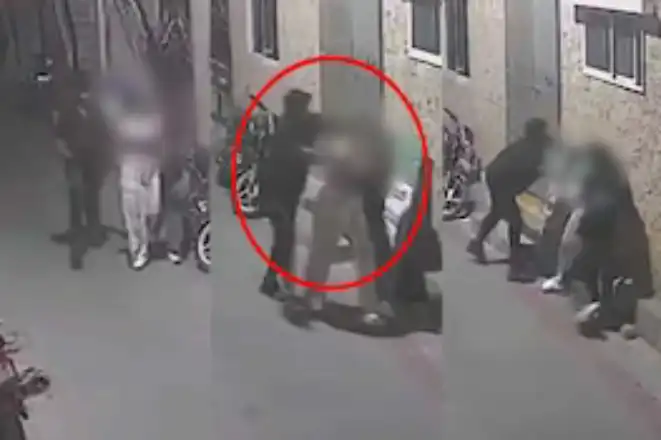Bengaluru Woman Attacked After Husband’s Mosque Complaint Sparks Controversy

Six men violently attacked a 38-year-old woman in Bengaluru after her husband lodged a complaint against her at a local mosque. The incident, captured on video and widely shared across social media, has sparked massive public outrage and calls for justice.
The woman, Shabina Banu, works as a house help and lives in the Tavarekere area. Her husband, Jameel Ahmed, took their personal dispute to the Jama Masjid, which led to a brutal outcome.
The Dispute That Escalated Into Violence
On April 7, Shabina’s relative, Nasreen, visited her at home. During the visit, a man named Fayaz also came over. The three went out briefly and returned home together.
Later that day, Jameel returned home and discovered both Nasreen and Fayaz in the house. Angered by the situation, he chose not to involve the police. Instead, he approached the Jama Masjid and filed a complaint against Shabina, Nasreen, and Fayaz.
National Commission for Women (NCW)
Link to the National Commission for Women website. This organization works on promoting and protecting women’s rights in India, which ties into the article’s focus on women’s safety and legal support.
Attack Outside the Mosque
On April 9, mosque authorities summoned the three individuals for a hearing. When they arrived, six men confronted Shabina and viciously beat her with sticks and pipes. The men left her severely injured.
A bystander recorded the incident on video. The footage, which went viral within hours, showed the men repeatedly hitting Shabina while onlookers attempted to stop them.
Link to a government page on the Domestic Violence Act of India, providing more context on the legal protections available to women in domestic violence cases.
Police Identify and Arrest the Attackers
After the video spread on social media, police quickly launched an investigation and arrested all six attackers. Officials identified them as:
- Mohammad Niyaz (32) – driver
- Mohammad Gauspeer (45) – scrap dealer
- Chand Basha (35) – sugarcane juice vendor
- Dastagir (24) – bike mechanic
- Rasool T. R. (42) – fisherman
- Inayat Ullah (51) – local resident
Police charged the men with attempted murder, criminal conspiracy, and assault under relevant sections of the Indian Penal Code.
Link to the Indian Penal Code for more information about the legal framework under which the attackers are being charged, especially under sections like attempted murder and criminal conspiracy.
Authorities Condemn the Assault
A senior Bengaluru police official condemned the violent attack. He emphasized that the law does not permit people to take justice into their own hands, regardless of personal grievances. He also warned that anyone who participates in or supports mob violence will face strict legal consequences.
Link to Women’s Safety, a platform offering legal resources, safety tips, and advice for women facing violence in India.
Why Religious Complaints Can Be Problematic
In some communities, people prefer to resolve disputes through religious or community leaders instead of legal systems. While these institutions often mediate family matters, this incident raises serious concerns.
Women’s rights groups criticized the mosque’s involvement. “No religious place should become a platform for punishment,” one activist said. “Community justice should never replace the rule of law.”
Shabina’s Current Health and Legal Support
Doctors treated Shabina for head injuries, fractures, and bruises at a Bengaluru hospital. She remains under medical care but is expected to recover physically.
Psychologically, Shabina has expressed fear and distress. Authorities are now providing her with counseling and police protection to ensure her safety during the legal proceedings.
Legal Proceedings Underway
The six accused men appeared in court and now face several serious charges. Legal experts say that if the court convicts them, they could receive 10 years to life imprisonment, especially under Section 307 (attempt to murder).
Activists have also urged police to investigate whether the mosque knowingly allowed or encouraged the assault. If proven, mosque authorities could face legal consequences.
Wider Concerns About Women’s Safety and Justice
The attack on Shabina has reignited national conversations about women’s rights and community-based justice. Many believe this incident shows the danger of allowing religious bodies to handle criminal matters.
In previous similar cases, like a 2022 incident in Uttar Pradesh where a community panchayat ordered an assault, courts intervened and declared such actions illegal.
Women’s rights organizations continue to call for better public awareness, legal education, and systems that allow women to safely seek justice. One advocate said, “When people bypass the courts and turn to community councils, women often suffer the consequences.”
The National Commission for Women (NCW) continues to work on strengthening legal frameworks and educating women about their rights under Indian law.
Conclusion
This tragic incident serves as a stark reminder of the consequences when people try to enforce justice outside the legal system. Instead of resolving the domestic dispute through lawful means, the attackers chose violence — and now face severe consequences.
Shabina’s story highlights the need for stronger enforcement of women’s rights, reforms in how communities handle domestic issues, and greater accountability from religious and social institutions.






